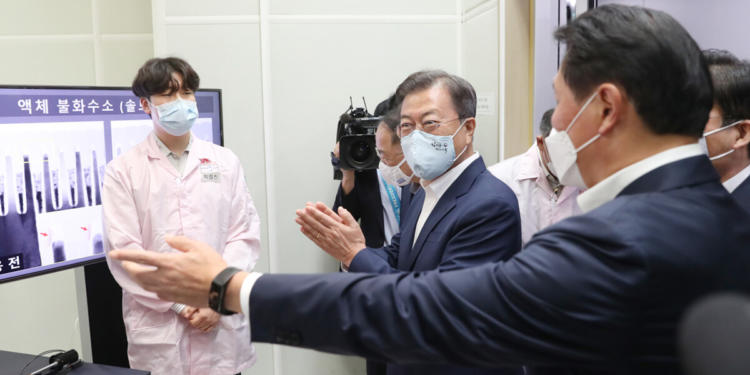South Korean President Moon Jae-in on Thursday visited the country’s second-largest chipmaker SK hynix’s DRAM cluster plant in Icheon, Gyeonggi Province, to review the advancements made since Japan’s imposed restrictions took effect a year ago.
In August last year, Japan removed South Korea from its trusted partners that benefit from minimum restrictions on the trade of sensitive materials for military use after a series of ruling by South Korea’s Supreme Court in 2018.
Japan tightened export restrictions on photoresists, etching gas, and fluorinated polyimide, which are essential for South Korea’s chip and display-panel industries.
The South Korean president initially negotiated Japan’s measures through bilateral summits in the World Trade Organization (WTO). However, the government failed to see Tokyo’s progress, not clarifying its position on the trade export curbs.
During a briefing led by Industry Minister Sung Yun-mo, President Moon announced that he would realign his administration’s midterm plans to foster domestic components, materials, and equipment manufacturers, as well as researchers in industries, which highly depend on imports.
The president added that the shift would take a more aggressive stand to stabilize South Korea in the global value chain.
Meanwhile, Minister Sung emphasized the significance of developing local products and technologies amid the ongoing trade war between the United States and China.
An Opportunity to Become a Global Leader
President Moon said that the ongoing crisis is an opportunity to walk a different path from Japan and become a leader in the international equipment, components, and materials industries.
To reduce the country’s dependence on imports and accelerate the growth of domestic core technologies for essential industrial parts and materials, South Korea would inject over 5 trillion won ($4.1 billion) in funds until 2022.
South Korea would develop supportive policies to foster leaders in the materials and components business by 2022. Over the next five years, the nation would also invest 1.5 trillion won ($1.25 billion) in establishing Korea as the international manufacturing hub for state-of-the-art technological products.
The government would prioritize semiconductors, future mobility, biotech, rechargeable batteries, and hydrogen businesses. The scope would then widen to include automobiles, electronics, and fashion.
Currently, SK hynix invested 120 trillion won ($100 billion) to build an industrial complex consisting of four semiconductor fabrication plants located in Yongin, Gyeonggi Province. Industry sources expect about 50 parts, materials, and equipment makers to join the cluster project covering about 4.5 million square meters.
The government aims to make Yongin in Gyeonggi Province a world-class chip cluster creating 17,000 jobs and generating 188 trillion won in added value.







